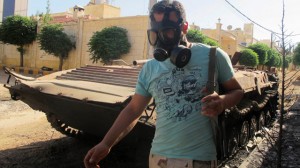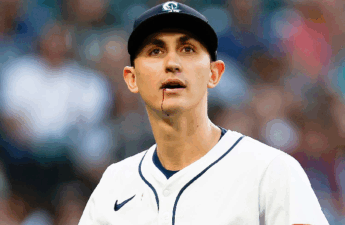The videos taken of apparent/alleged/possible/probable chemical-weapons attacks in Syria got me thinking. No one, at least as of this morning (I haven’t heard updates later in the day) seemed to know what to think of them. Are they trumped up by the rebels to curry favor and sympathy with the West? Are they authentic? Are they misrepresenting their time, place, or manner in some way that’s hard to track? Are they the result of the rebels themselves using gas? There was discussion in some of the reporting that “metadata” was insufficient to really determine whether the videos were created today or not. No one quite seemed to know what to do with the information that there was apparent video of an apparent chemical attack. Because we live in an era where one cannot simply believe what one sees on the screen.
Which makes you wonder: is that the check on surveillance culture? I know I’ve said in the past that there is no check meaningfully, except to let go of the possibly antiquated concept of privacy. But this could be premature. I may be attributing a terminal victory to one side in something that’s a lot more like people curing one disease and just needing to wait a couple years for the next one to crop up and start infecting people. (Not to pass judgment on which side is “right” here – maybe you’d prefer the analogy of one disease starting to kill off huge numbers of people and just waiting a few more years for the cure.)
What if the response to surveillance is that it gets so easy to make such quality fake imagery or data that it doesn’t matter how much you survey?
Now there does seem to be a fundamental problem here, which is that if the surveillance is good enough, then it would pick up on people creating the fabrication that they would then be passing off as something real. If someone knows your every move, association, viewpoint, and whereabout, they will be able to tell when you’re filming some highly elaborate ruse, or even manufacturing it on some super-ultra-blue-ray-green-sun-high-def computer drafting software. But maybe, despite this apparent flaw, creating the simulation of virtual reality that’s compelling enough to look like the real thing is the counter-play to watching every door, window, and exit in real reality. We’ve probably all seen a heist movie, even recently, where some elaborate slide or video recording was slid in front of the monitoring security camera to make it look like things were more or less okay within than they truly were. How hard would that be to pull off on a computer with the right hacking technique?
Certainly I don’t know exactly where I come down on this, being as opposed to privacy as I am and feeling that we might all just be better people without it. Crime has been crashing all over the country and people are having trouble putting their finger on exactly what’s changed, especially in an era when the economics of the situation would otherwise state that crime ought to be surging. While New Yorkers are discussing whether it’s about “Stop and Frisk” and the NSA would certainly have you believe it’s because they’re listening to your phone calls, I think it’s about a much softer version of the Surveillance Society, namely all the private awareness that’s going on. After all, neither NYPD nor the NSA are out there actively preventing most of the crime, yet it’s falling nationwide. It seems like the advent of social media, the personal expectation that your whereabouts are constantly accounted for, the integrated use of cameras not from the NSA, but from every storefront and business and cell phone, this is creating a collective culture where people just know what’s up with everyone else and crime is much harder to pull off. It’s no wonder that so many of the high-profile criminals still trying (i.e. school shooters) aren’t even trying to get away with it. Why bother? A video will emerge and the electronic trail will lead to your doorstep regardless.
So part of me feels sad that privacy might resurge and bring all this bad action with it. At the same time, as I’ve discussed repeatedly, the end-of-privacy project really only works when it’s universal and the people are able to check the government with its own lack of privacy just as much. Otherwise, it’s transparently just tyranny. This is the difference between 1984 as written and a world where you can switch on a camera and see the operations in Miniluv as depicted. Obviously double-speak becomes a lot less effective when everyone can see right through it.
Which is probably why governments are working so hard to cover up their actions right now, crushing Bradley Manning and Glenn Greenwald in as intimidating a fashion as they can muster. They’re telling you it’s to keep you safe, but we don’t need a one-sided monopoly of information in order to do that. We just need the information out there to keep us safe. The effectiveness of a spying program on terrorists isn’t that the terrorists might not suspect you’re spying on them! (Who could possibly see that coming??!?) It’s that you, um, get the information you’ve spied from them. And I’m sorry, but if the worst impact of the recent leaks is that the terrorists can now only use carrier pigeons to communicate, that sounds fairly disruptive to me. Rather more disruptive, frankly, than hoping they pick up a tapped phone and give you, at best, a Coventry problem.
Also, you can probably steal a carrier pigeon. Just sayin’.
Leaking information doesn’t compromise safety. It is safety. But it has to be a two-way street, or a seven-billion-way street to be effective. So if governments are, in fact, going to effectively clamp down on the way that’s pointing to them and hide from all this information-soaking that’s making us all much safer, then perhaps it’s good that CGI and virtual reality could give us a way out of the one-way surveillance state. For you youngsters out there, I recommend a couple classes in computer science posthaste.
In the meantime, can we please stop arguing that we are made safer by a government that knows everything but divulges nothing? Or that people who disagree with that type of government are somehow trying to compromise or jeopardize our safety? Most people, when talking about safety, are discussing the safety to be free. The safest people in America live in solitary confinement, if you want to be technical about it. Ideally, our society would tip the scales at least a little back toward freedom on this freedom-safety continuum when claiming to “protect” the average citizen.



